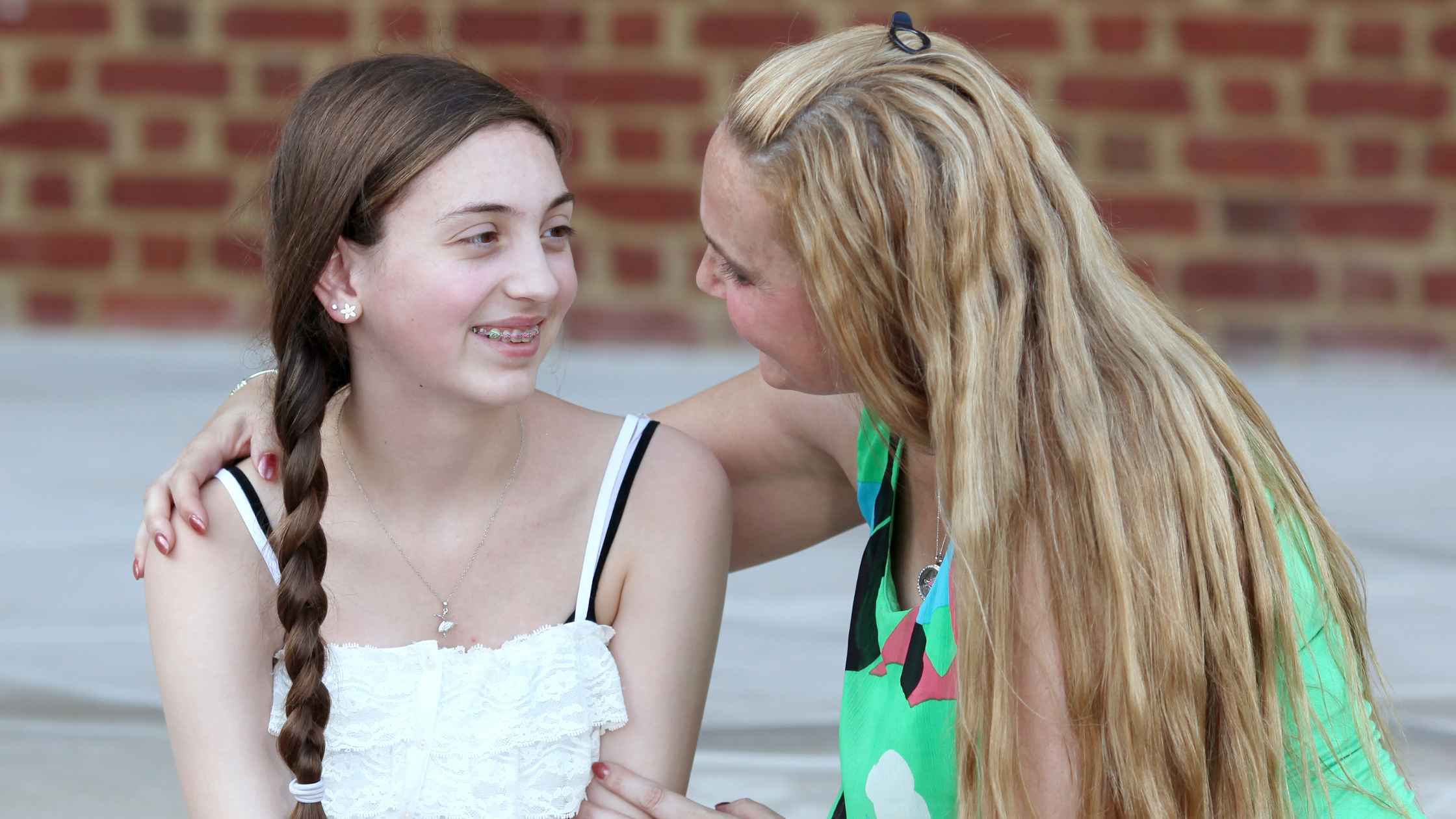As a parent of teenagers, few things are more frustrating than dealing with disrespectful behavior. The eye rolls, the back talk, the blatant ignoring when you call their name – it can make you want to pull your hair out!
I’ve been there. As a mom of two teenagers, I know firsthand how challenging it can be. My oldest daughter just turned 17, and let’s just say we’ve had our fair share of power struggles over the years.
But through trial and error, I’ve learned a few tricks that have really helped improve the mutual respect between us.
Teaching respect doesn’t happen overnight. It requires empathy, patience and consistency from us as parents. But with the right approach, it is possible to cultivate a relationship built on understanding and care.
In this comprehensive guide, I’ll share expert strategies from experienced moms for dealing with disrespect, understanding the root causes, setting reasonable expectations, and ultimately teaching teens how to communicate respectfully. Let’s dive in!
Understanding Disrespect in Teenagers

Disrespectful attitudes in teenagers often point to something deeper going on under the surface. Their brains are growing rapidly, hormones are surging, and the world around them still feels new and confusing.
As one mom said, “Disrespect is often a symptom of a deeper problem in kids.” It’s easy as parents to take their behavior personally, but it helps to look deeper.
Disrespect as a Symptom
Teenage disrespect typically comes from unmet needs, confusing life changes, or simply immature social skills.
If we look below the surface behavior to the root causes, we can address issues with more empathy and find solutions.
Some questions to ask when faced with disrespect:
- Has something happened recently that is bothering them?
- Are they tired, hungry, hormonal, or otherwise unregulated?
- Does it relate to developmental changes they don’t fully comprehend?
- Have I set reasonable expectations and boundaries?
- Are my responses respectful, or am I unintentionally escalating tension?
Examining our own role is also key. If we act from a place of understanding and model respectful communication, teens are far more likely to follow suit.
The Teenage Years
The teen years are full of monumental changes. Physically, cognitively, emotionally – everything feels in flux. It’s an intense and confusing developmental phase marked by self-exploration.
In the words of one wise mother, “Kids in their teen years are often misunderstood because adults quickly forget what it was like.”
We forget those painful, awkward years of questioning identity and pushing boundaries. Teens need empathy, guidance and room to safely explore.
When they challenge us, it comes not from spite but from normal development. By extending grace and understanding, we allow them to learn respectfully within healthy relationships.
Warning Signs

While some teenage disrespect stems from normal growing pains, consistent issues demand attention.
Recurring patterns like those below indicate cracks in the foundation of mutual understanding and care:
- Rolling eyes, sarcasm, ignoring requests
- Yelling, hurtful language, destructive tantrums
- Manipulation, lies, secrecy, rule breaking
- Refusing accountability, blaming others
If you notice these warning signs, don’t despair. There is hope, even for strained relationships. Commit to self-reflection, seek help if needed, and double down on respectful communication.
Consistency and care can mend even the most fractured bonds between parent and teen.
Understanding the Teenage Mind

Beneath the angst and attitude lies a complex tangle of neurological changes. By appreciating what’s going on developmentally, we can respond to teens with greater empathy and insight.
The Ever-Changing Brain
During adolescence, the brain transforms rapidly in size and structure. Neuronal connections proliferate before pruning back in the mid 20s. The prefrontal cortex, which governs planning and self-regulation, develops slowly over this time.
These changes result in “new feelings they don’t quite understand.” Teens experience intense emotion and hunger for rewards, while their judgment and inhibition lag behind. It’s the perfect recipe for impulsiveness and risk-taking.
Understanding the science behind their developing brains allows us to set reasonable expectations and respond with patience. Their actions may exasperate us, but by extending grace, we allow them to learn respect within safe relationships.
Why Teens Struggle
Given the turmoil of puberty paired with a still-developing brain, it’s no wonder teens struggle with respect. Despite understanding expectations for respectful behavior, they often lack the self-regulation to consistently meet them.
As parents, the temptation is to blame them for disrespect. But “that same disrespect you dish out when you have a bad day,” one mom points out. Teens need empathy, not judgment.
That said, allowing bad behavior enables rather than supports. With radical brain development, teens need guidance in practicing emerging skills like self-control, perspective-taking and conflict resolution.
As parents, we must hold them accountable while also allowing safe space to stumble.
Is It Too Late to Teach Respect?

Many parents ask what to do when disrespectful patterns are already entrenched. Is it too late to restore mutual understanding?
The answer is a resounding no. But it does require commitment to change from both sides.
It’s Never Too Late
“It’s never too late to get your teenager to respect you,” says one counseling expert, “but you might need to shift your perspective.”
Rather than fixing them, look inward at your own role.
Ask yourself:
- Have I modeled empathy and understanding?
- Do they feel respected, heard and valued?
- Have I established clear, consistent expectations around respect?
- What can I change about my approach?
Restoring mutual respect requires self-reflection, responsibility, boundary setting and compassion from both parties.
But by shifting inward and addressing underlying issues with care, reconciliation is possible at any age.
Older Teens
For parents struggling with older teens, don’t lose hope. One key is assessing whether disrespect reflects normal development versus unhealthy patterns.
Talk to school counselors, therapists or parenting mentors if you need outside perspective.
If mutual care and accountability are lacking, family therapy can help uncover and address underlying issues. An outside expert may provide the catalyst needed to restore understanding.
The teen years can be trying, but even strained relationships hold possibility for growth. With work from both sides, respect can flourish.
Warning Signs of Disrespect

Disrespect manifests in various ways depending on age, but common themes emerge. Noticing these red flags early allows us to course correct respectfully.
Signs of Disrespect
- Eye rolling, sarcasm, ignoring requests
- Yelling hurtful things, door slamming, destructive outbursts
- Manipulation, secrecy, lying to avoid consequences
- Refusing accountability, blaming others unfairly
These behaviors signal a lack of respect and need to be addressed. The temptation as parents is to react harshly out of embarrassment or anger.
But remember, disrespect often hides underlying issues needing compassion.
See beyond the behavior to the hurting human within. Respond firmly yet calmly, focusing on solutions.
Set clear expectations around respect while also hearing their perspective.
The Role of Communication

At the heart of mutual respect lies open communication. When tensions run high, taking space to cool off can help. But addressing issues directly and non-judgmentally is key.
As one mom advises, “Ask them if something happened…that is bothering them.” Then listen, reflect and validate feelings before setting expectations.
Make it clear respect is non-negotiable while also allowing them room to process challenges.
Open and honest communication, free of blame and judgment, goes a long way in building mutual understanding and care. Model this in your responses, and respect is sure to follow.
Expert Strategies for Teaching Respect

Cultivating respect in parent-teen relationships is no easy task. But with time and intention, mutual understanding can grow.
Below are some tried and true techniques from experienced moms.
Ask About Their Day
“Ask if something happened at school or in their day that was hard.” Then listen without judgment. Validate their feelings and offer empathy before discussing solutions.
This simple act of care and understanding prevents tension from spiraling while strengthening trust.
Making this a daily habit provides space for teens to open up in their time, reducing bottled up feelings.
It also models healthy communication so they learn to express struggles respectfully.
Don’t Take It Personally

Easier said than done, but “you can’t take their bad attitude personally.” Teens tend to unleash on parents simply because they are safe targets. Remember that you are not to blame.
Extend grace knowing this is a temporary phase, albeit a painful one. Talk through issues respectfully but avoid overpersonalizing.
Model calmness and restraint in your responses. This level head will provide stability amidst the relational chaos of adolescence.
Present Facts About Mutual Respect
When tensions run high, fall back on fundamental values like mutual care and understanding. As one mom reminds her teen, “God wants us to act respectfully to one another because he loves each and every one of us.”
Frame respect as the foundation of healthy relationships. We all have bad days, but common decency and accountability prevent further harm.
Present these facts gently when confronting disrespect, not punitively. The goal is increasing emotional intelligence through open and caring dialogue.
Consider Physical Well-being

Ask any parent – failure to care for basic needs like food, water and sleep leads to negative behavior. Yet teens rarely self-regulate these essentials.
Gently guide teens toward healthful routines. Remind them “if you are hungry, tired or otherwise unregulated, irritability often follows.” Teach self-care as the first step in self-respect.
Building these habits not only improves mood but also strengthens self-confidence. Help teens see the mind-body connection by modeling and encouraging small acts of daily care.
Teach Healthy Self-Care
When tensions run high, “teach them self-care – to respect themselves.”
Provide space for alone time and explore coping strategies like journaling, music or being in nature. Discuss what self-care looks like for you when struggling emotionally.
Guide them gently to take ownership of their inner landscape. Emotional resilience stems from the myriad small choices we make to care for our minds and bodies.
Making this conscious practice a regular habit will help teens weather challenges with maturity.
Positive Parenting Tools

Beyond broad techniques for teaching respect, various tools help reinforce respectful values. Below are a few of my favorites.
Screen Time Protection
In today’s oversaturated digital era, monitoring screen time is essential for teenagers’ well-being. I partner with Bark, software allowing parents to protect kids from dangers like cyberbullying or explicit content.
Their phone alerts also reduce risky secrecy enabling more open communication.
Communication and Emotional Bonding Tools
The Pinwheel Phone is a top choice for teen’s first phone, with design cues promoting more real-life interaction.
For deeper connections minus screens, our family loves Our Moments – a dinner card game with questions sparking meaningful conversation. Try hosting “no phones dinner” weekly as protected space to bond.
On a budget? Journaling allows emotional processing and self-expression, helping prevent tensions from boiling over. Grab journals and pens, stir some hot cocoa, and make it a cozy family activity!
Chores to Build Responsibility
Implementing age-appropriate home chores teaches follow through and shared responsibility. We use a customized magnetized chore chart displayed on the fridge with tasks assigned by week.
Simple to update, it provides a visual reminder to uphold expectations around the house.
Healthy family relationships require constant nurturing. Try out these tools and more, taking advantage of everyday moments to strengthen the bond of mutual respect.
Other Mom Perspectives

Mothers have a wealth of wisdom around raising respectful teenagers. Below are some creative ideas from fellow parenting bloggers for your toolkit.
Unique Strategies
- Knock before entering their room to respect privacy needs as they grow more independent.
- Take their opinion into account by allowing choice around smaller decisions. Being heard builds mutual trust.
- Provide leeway around bedtimes so they learn time management skills firsthand. Natural consequences teach more than lectures.
Encouraging Respect
- Model respect daily through actions big and small. Kids notice when we interrupt, judge, negate emotions, or act entitled. Be the change.
- Promote empathy by discussing others’ perspectives. Help teens recognize our shared humanity despite differences.
- Listen actively when teens speak. Repeating key phrases back and asking curious questions makes them feel heard.
Personal Reflections
Personally, establishing consistent expectations around respectful communication has been game changing.
We revisit house rules yearly, updating them collaboratively. Giving teens input prevents later rebellion while still maintaining accountability.
I also cannot stress enough the power of modeling. Setting a phone limit for my teens meant enforcing the same for myself. Did they always like it? No. But seeing me sacrifice too communicated priority and care. Lead by example.
While every child and situation differs, I hope these reflections provide a few sparks of inspiration. Keep trying new approaches until you find what resonates.
Additional Parenting Tips
Beyond respect specifically, below are a handful of gems I wish I knew when first entering the parenting trenches. Consider these your bonus tips for maintaining sanity and connection while raising teens.
Advice Teens Will Actually Listen To
- Don’t lecture. State expectations clearly without justification or threats.
- Discuss rules and consequences when tensions are low, not in heated moments.
- Balance correction with empathy. “I know this is hard but this behavior cannot continue.”
- Allow natural outcomes to teach when appropriate. Judiciously chosen freedom builds maturity.
Ensure Respectful Behavior
- Parent as a unified team. Disagree privately so kids can’t manipulate differences.
- Confront disrespect early and consistently. Nipping patterns prevents worse habits.
- Don’t argue with teens. Calmly reinforce rules and walk away if needed. Their developing brains escalate easily.
Overcoming Inner Criticism
Raising respectful kids means overcoming the brutal inner critic. Perfectionistic tendencies in parents often enable disrespectful behaviors by preventing us from confronting issues consistently for fear of being the “bad guy.”
Give yourself grace knowing you cannot control others’ behavior, only your responses. Then set boundaries with calm confidence, focusing on mutual growth.
For lasting change, address roots of people pleasing tendencies in counseling or life coaching. Believing you must earn love through performance drains vital energy needed for parenting.
Learn to separate healthy high standards from soul-crushing perfectionism. Freedom awaits!
Coping With Parenting Challenges
Between teenage turbulence and toddler tantrums, parenting can overwhelm even the most patient.
On chaotic days, step back and assess what you realistically can handle. Saying no to extra activities prevents meltdowns all around.
Long term, make margin for self-care a priority. Whether long baths, lunch dates with friends or mornings to write while kids sleep, don’t neglect filling your own cup.
The greatest gift to family is modeling healthy balance by honoring personal needs alongside parenting duties.




